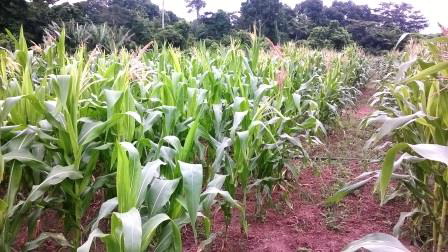|
Cycle 4 (2015 Deadline)
Development of high yielding aflatoxin resistant maize hybrids for improved nutrition and health in Ghana PI: Allen Oppong (alnopp@yahoo.co.uk), CSIR-Crops Research Institute
U.S. Partner: Marilyn Warburton, USDA ARS Corn Host Plant Resistance Research Unit
Project Dates: October 2015 - September 2018
Project Overview
 | Maize field (photo courtesy of Dr. Oppong)
|
Dr. Oppong and his team will apply SSR and SNP aflatoxin-resistant markers to help speed up the development of aflatoxin-resistant maize for Ghana. The incorporation of aflatoxin resistant genes into local elite inbred lines for the production of high yielding hybrids will not only improve maize availability in Ghana but will also improve the nutrition and health of Ghanaians. The process of developing aflatoxin-resistant maize will enhance the skills of Ghanaian scientists in using marker-assisted selection/breeding to hasten maize breeding activities in Ghana, and these modern techniques can also be utilized in other breeding activities for improved biotic stress resistance in Ghana and beyond. Currently, the use of marker-assisted breeding is at the initial stages in Ghana, and using aflatoxin-resistant markers will reduce considerably the time needed to breed for high yielding aflatoxin-resistant maize in Ghana.
First of all the development of aflatoxin-resistant maize will not only impact positively on the nutrition of Ghanaians but also will have a tremendous impact on health of mothers, children, poultry, and livestock. Improving maize yields can substantially raise farmers’ income and livelihoods. It will also provide raw material for the poultry industry to increase poultry production and consequently address protein needs of Ghanaians.
Currently, Ghana is not self sufficient in poultry, partly due to the high cost of maize used in poultry feed. Consumption of aflatoxin-contaminated maize also has detrimental effects on unborn babies, child health, child development, and survival. Developing aflatoxin resistant maize will address these challenges thereby enhancing the overall well-being of Ghanaians. In addition, the acquisition of equipment to support marker-assisted selection will improve the technical infrastructure at the Crops Research Institute.
The improved human resource capacity that the project will produce can also deployed to address other stress breeding challenges
Final Summary of Project Activities
The main objectives of this project was to apply Simple Sequence Repeat (SSR) and Single Nucleotide Polymorphic (SNP) aflatoxin-resistant markers to help speed up the development of aflatoxin-resistant maize for Ghana and also equip human resources with the skill needed for marker assisted selection especially, breeding for aflatoxin resistant varieties in Ghana. The project has currently identified 10 potential high yielding hybrid varieties, which are being tested in multi-locational environments to assess their stability and the best performing lines for eventual registration and release as varieties for use and cultivation in Ghana. These promising hybrids were obtained following a strict selection regime involving field phenotyping and genotyping using SSRs and SNP markers with the support of laboratory analysis and quantification of aflatoxin levels.
The PI reports that the laboratories of CSIR-CRI have been equipped with basic equipment needed for aflatoxin detection and quantification that never existed prior to the implementation of the project. The VICAM aflatoxin set up which also included consumables provided by the project is currently being used to detect and quantify aflatoxins in maize. Similarly, the acquisition of the Microplate reader as well as KASP reagents for SNP analysis has enabled the Institute to carry out marker assisted selection using SNPs.
The human resource capacity of the of CSIR-CRI has improved considerably following training received by project staff and students especially, the skills for marker assisted selection with SNPs and SSRs for breeding for high yielding aflatoxin resistant maize varieties.
The project organized a training course, which attracted over 40 participants from various stakeholder institutions in the country, namely; CSIR-Crops Research Institute, Kumasi, Kwame Nkrumah University of Science and Technology, Kumasi, West Africa Centre for Crop Improvement (WACCI), University of Ghana Legon and CSIR-College of Science and Technology, Kumasi. The participants were trained on how to use SNP and SSR Marker for breeding as well as how to detect and quantify aflatoxins in maize using the VICAM aflatoxin detection and quantification set up. Until the training CSIR-CRI had no capacity to detect aflatoxins in maize.
Currently, CSIR-CRI is advertising its capacity to detect and quantify aflatoxins in maize to interested stakeholders. The PI hopes that these services when used by farmers will inform farmers the aflatoxin status of their maize before they are consumed. With close to realization of developing high yielding stable aflatoxin resistant varieties in Ghana, it is believed that these varieties when they are available can highly contribute to the nutrition and health of Ghanaian maize consumers thereby improving their health.
The next phase of this work after identifying two or three high yielding aflatoxin resistant hybrids is the registration and release of these genotypes as varieties for use and cultivation in Ghana. This is a crucial step to make all the work done so far complete for utilization and consumption by the general public. It is estimated that in the next two years this can be become a reality. Dr. Oppong’s wish is to secure funding for this purpose as early as possible so that the benefits of growing and consuming high yielding aflatoxin resistant maize hybrids by Ghanaian maize consumers and farmers will be realized within the shortest time.
Back to PEER Cycle 4 Grant Recipients
|




